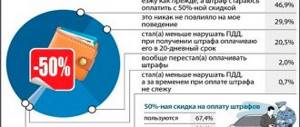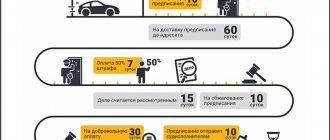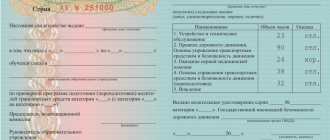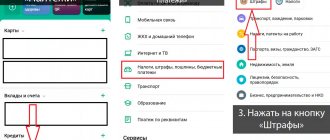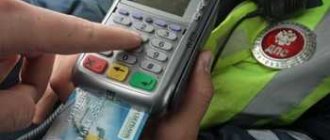The order to pay fines for violating the Traffic Rules, like any official document, has a fixed deadline for its execution.
The repayment period for traffic fines from May 9, 2013 is 60 days, which are calculated from the moment the resolution comes into force. And it comes into force immediately after the expiration of 10 days given for the possibility of appealing the fine to the State Traffic Inspectorate or court.
Today we will talk in detail about the nuances of calculating the repayment terms of administrative fines for traffic violations, point out the possibility of obtaining a deferment or installment plan for fines, and also talk about liability for their late payment.
What is the deadline for paying traffic fines?
To find out how long the law allocates for paying off fines for administrative offenses (including traffic violations), just refer to Article 32.2 of the Code of Administrative Offenses of the Russian Federation. It states that fines are paid in full within 60 days from the date of entry into force of the decision imposing an administrative fine.
When exactly does the resolution come into force? Let us turn for clarification to the full text of Article 31.1 of the Code of Administrative Offenses of the Russian Federation:
A decision in a case of an administrative offense comes into force:
1) after the expiration of the period established for appealing a decision in a case of an administrative offense, if the said decision has not been appealed or protested;
2) after the expiration of the period established for appealing a decision on a complaint, protest, if the said decision has not been appealed or protested, except in cases where the decision cancels the decision;
3) immediately after making a non-appealable decision on a complaint or protest, except in cases where the decision cancels the decision.
The driver is given exactly 10 days to appeal from the moment he receives the decision (or a copy thereof). If the decision was issued by a traffic police inspector, then the countdown of 10 days to appeal it begins immediately, that is, the next day will be the first.
If the decision came by mail (in the case where the violation was recorded by automatic traffic cameras), then the period is counted from the day it was delivered by the postman or from the day the driver received the mail notification.
Important! If you evade receiving the document, the resolution will inevitably return to the addressee (the traffic police authority) and will still come into force 10 days after the return.
As a result, we find that the time for paying the fine includes:
10 days (appeal) + 60 days (payment of fine) = 70 days (from the date of receipt of the decision)
Petition to reduce the fine under the Administrative Code.
A less popular and more difficult to obtain method of reducing fines. The idea is that the judge, in the presence of exceptional circumstances, imposes a fine below the minimum amount provided for by this article of the Code of Administrative Offenses. The maximum fine can be reduced by 50%.
- How to obtain: When considering a case, make a petition under Part 2.2 of Article 4.1 of the Code of Administrative Offenses of the Russian Federation to impose a fine below the minimum amount. Document the existence of exceptional circumstances. They must be related to your person, property, nature and consequences of the violation. There are no specific criteria in the law.
- Nuances: The result is not guaranteed, because The judge may impose a fine below the lowest, but is not required to do so. Does not apply to articles for which the minimum possible fine is less than 10 thousand rubles. The method can be used not only for fines for traffic violations, but also for other articles of the Administrative Code.
More for car enthusiasts: A car owner’s worst nightmare: the bank takes the car for someone else’s debts
Do you want to be the first to read new posts from the Lawyer Cat? Subscribe to my channel on Telegram @kotjurist and TamTam.
Transferring the fine to bailiffs
However, 70 days is not quite the correct period during which a driver can pay a fine without serious consequences. The fact is that after 70 days, the fine case is transferred to bailiffs for execution, and the law allots another 10 days for this procedure. That is, forced collection of a fine occurs only 80 days after receipt of the decision on the violation:
10 days (appeal) + 60 days (time to pay) + 10 days (the traffic police fine is handed over to the bailiffs) = 80 days
When the bailiffs find the debtors, they give them another 5 days to pay the fine voluntarily. In the case where the debtor was actively hiding from government officials and evading payment of the debt, the statute of limitations on his case (which for administrative fines is 2 years) is extended for the entire period while the offender was “on the run.” This will happen immediately after the bailiffs find the debtor.
It turns out that if during the statute of limitations for a traffic fine you actively avoid meeting with the bailiffs, then you should not count on the fact that after 2 years you will no longer be held accountable. But if for two years after the imposition of a traffic fine (and another 10 days that were given to appeal it) no one looked for the driver, then after their expiration no one will be able to request a fine.
Important! The statute of limitations should not be confused with the statute of limitations for holding people accountable for violating traffic rules. If after committing an offense within two or three (if the case is being considered by the court) months you have not been served with a decision, then responsibility for the offense does not arise.
What is this new law?
We are talking about a draft of a completely new, modernized Code of Administrative Offences. We have already written earlier about its development and discussion, as well as about changes in the amount of fines in it. You can also read its official text (just note that the document is currently being finalized, and amendments will probably be made to it).
Among the main changes that are known today are the following:
- increase in fines for a number of traffic violations,
- increasing the terms of imprisonment also for violations of the Rules,
- all penalties in the field of road safety have moved from chapter 12 to the new chapter 21,
- also, a number of publications report that the discount on traffic police fines will be cancelled, however, this is not true yet - the discount is still provided for in the draft of the new Code of Administrative Offenses,
- Another innovation is the elimination of fines.
And that’s exactly the last new feature we’ll talk about!
Deferment and installment of fine payments
Sometimes the fine for violating the Traffic Rules is quite large, so the driver does not have the financial ability to pay it within the period allocated by law (70 days). In this case, he has the right to go to court, present evidence of poor financial situation (for example, a certificate of salary or lack of work) and ask for an installment plan or deferred payment. This possibility is reflected in Article 31.5 of the Code of Administrative Offenses of the Russian Federation.
What is the difference between installment plan and deferment?
- The deferment provides for a postponement of the payment deadline by 1 month, that is, the driver will have more time to pay off the traffic police fine;
- Installment plan – payment of the fine in installments over 3 months (the driver receives a monthly debt repayment schedule).
In what situations can you evade punishment?
Before you find out whether you can avoid paying fines from cameras, you should find out about the terms of debt repayment. By law, funds must be deposited 60 days in advance. Moreover, in the first 20 days the driver can receive a discount. Within 10 days, the motorist has every right to appeal the decision. If a violation is recorded on camera, you need to file a complaint with the appropriate center.
Unfortunately, there are practically no absolutely legal methods to eliminate the need to bear responsibility. It happens that there is an error in the system, and in such cases the punishment is completely unreasonable and illegal.
Attention! When resolving controversial situations, the driver is required to provide photo or video materials confirming the fact of the unlawful action.
When considering how to avoid paying traffic fines from cameras, you need to consider the following:
- The driver is not required to be punished if the violation itself is not visible on the footage.
- The owner of the vehicle should not transfer funds if there is no information about the fine in the traffic police database.
- You can challenge the collection if the registration plate is difficult to see.
- It is easy to appeal the decision if the fine came to a completely different car (this case is due to errors in the system)
It is important to know! Having figured out how to avoid paying traffic fines legally, you should pay attention to one more aspect. According to the law, the punishment must be borne by the person who was driving. However, by default the automatic system draws up a protocol in the name of the vehicle owner. Therefore, if the owner of the car proves that he was not driving the car, then he should be exempt from paying.
Responsibility for late payment of fines
What happens when the 70 days assigned to pay the fine expire? As we have already said, the case will be transferred to bailiffs, who have the right to apply the following types of punishment to the driver:
- a twofold increase in the amount of the fine (minimum by 1,000 rubles);
- assignment of community service for up to 50 hours;
- administrative arrest for up to 15 days.
The listed penalties are indicated in Part 1 of Art. 20.25 of the Code of Administrative Offenses of the Russian Federation and only a judge has the right to appoint them. In the vast majority of cases, a doubling of the fine is used. If community service is chosen as a punishment, it will not exceed 12 hours a week, which will force the driver to engage in community service for up to 2 months.
Important! Punishment in the form of arrest is applied only to the worst defaulters, who have a huge number of unpaid fines.
Bailiffs have the right to collect the assigned fine by seizing bank accounts or personal property of the defaulter. If the amount of debt exceeds 10 thousand rubles, then the debtor will be prohibited from traveling outside of Russia. By decision of the court, a special punishment may be applied to such fines - restriction of the validity of the driver's license.
The restriction is lifted only after all traffic police fines have been paid, and if the driver is caught driving a car with a limited license, then he faces real deprivation of his license for up to 1 year or 50 hours of community service.
Fine 5,000 rubles for other violations at crossings
Let's consider the updated part 2 of Article 12.10 of the Code of Administrative Offenses:
2. Violation of the rules of passage through railway crossings, with the exception of cases provided for in Part 1 of this article, -
shall entail the imposition of an administrative fine in the amount of one thousand rubles.
2. Violation of the rules of passage through railway crossings, with the exception of cases provided for in Part 1 of this article, -
shall entail the imposition of an administrative fine in the amount of five thousand rubles.
In this case, to 5,000 rubles . Others include any violations other than the following:
- crossing a railway track outside a railway crossing;
- leaving a railway crossing when the barrier is closed or closing, or when there is a prohibiting signal from the traffic light or the crossing officer;
- stopping or parking at a railway crossing;
- driving through an uncontrolled railway crossing if a train is approaching the crossing within sight.
Fines for violations at railway crossings are increasing significantly. So if you have forgotten the rules related to moving, I recommend that you study the corresponding series of articles:
Railroad crossing rules
Paying off a traffic police fine with a 50% discount
Since the beginning of 2021, a law has been in force in Russia to reduce fines for traffic offenses if they are paid within the first 20 days after the decision is issued. The discount in this case will be exactly 50% of the original fine amount (Part 1.3 of Article 32.2 of the Code of Administrative Offenses of the Russian Federation). If the execution of the decision on an administrative fine is delayed or spread out by the judge, then the 50% discount will not apply.
The discount on payment of a fine within 20 days after the driver receives the order is valid for all types of violations of the Traffic Rules, with the exception of those that are most dangerous to society, committed repeatedly or while intoxicated.
What fines are not subject to the discount?
The list of fines that the law does not allow to be paid with a 50 percent discount:
| Article of the Administrative Code | Violation |
| Article 12.1, part 11 | Repeated driving of an unregistered vehicle. |
| Article 12.8 | Driving or transferring control to a person who is intoxicated. |
| Article 12.9, parts 6 and 7 | Repeatedly exceeding the speed limit by 40 km/h or more. |
| Article 12.10 (from 1 May 2021) | Violations when crossing railway tracks. |
| Article 12.12, part 3 | Repeated driving through a prohibitory traffic light. |
| Article 12.15, part 5 | Repeatedly entering the oncoming lane. |
| Article 12.16, part 31 | Repeated driving in the opposite direction on a one-way road. |
| Article 12.24 | Violation of rules resulting in harm to the health of the victim. |
| Article 12.26 | Refusal to undergo a medical examination for intoxication. |
| Article 12.27, part 3 | Use of alcohol, drugs or psychotropic substances after an accident. |
Statute of limitations for fines
There is another deadline associated with paying traffic fines. This is the statute of limitations, which is regulated by Article 31.9 of the Code of Administrative Offenses:
1. A resolution on the imposition of an administrative penalty is not subject to execution if this resolution has not been enforced within two years from the date of its entry into legal force.
That is, bailiffs and traffic police officers will stop dealing with fines 2 years from the date the resolution comes into force.
Example. Andrey's resolution came into force on March 22, 2021. Moreover, if the fine is not paid voluntarily or forcibly collected by March 22, 2021, then the case will be closed.
Statute of limitations for traffic police fines
